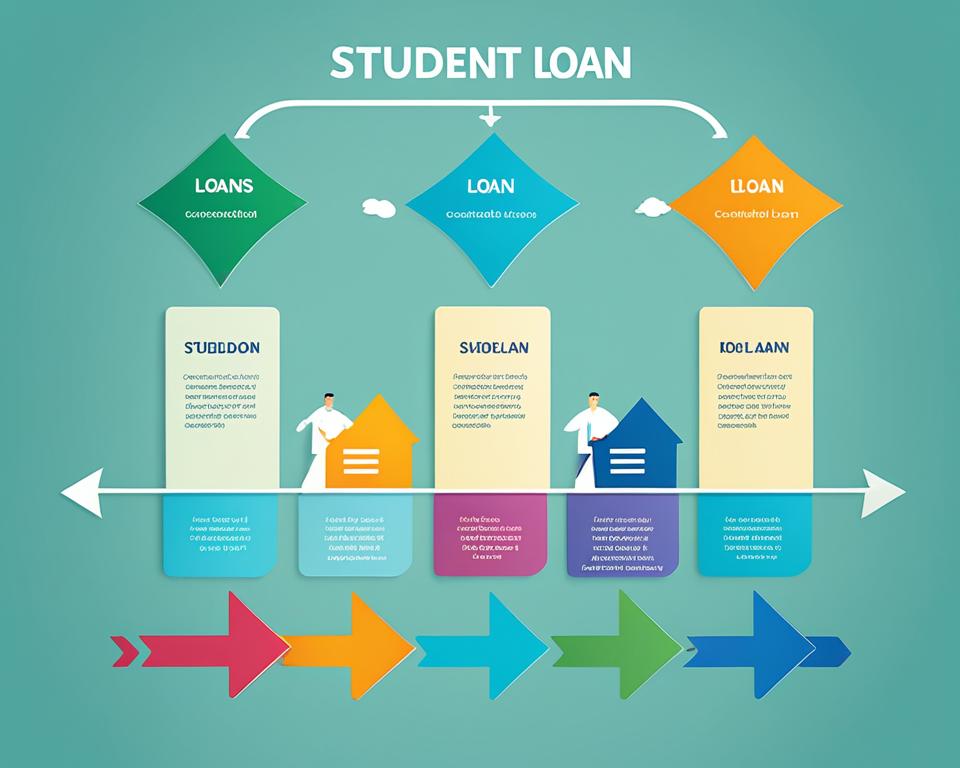For many Americans, debt consolidation offers a beacon of hope in a sea of monthly bills and variable interest rates. But in their search for financial clarity, individuals must tread carefully to avoid falling victim to debt consolidation scams. Understanding how to safeguard against debt consolidation fraud is critical for those looking to regain control over their finances without compromising their personal and financial security. Throughout this discourse, they will learn to navigate through the myriad of offers and protect themselves from debt consolidation scams with diligence and informed decision-making.
Key Takeaways
- Recognize the importance of diligence when seeking debt consolidation solutions.
- Learn the common indicators of potential debt consolidation scams.
- Utilize vetted information to safeguard financial well-being.
- Stay informed about the legitimate practices of debt consolidation services.
- Prioritize transparency and documentation in all financial dealings.
Understanding Debt Consolidation and Its Benefits
Debt consolidation is a strategic approach aimed at simplifying an individual’s financial landscape. By examining how this process can potentially provide improved terms and rates, one can assess the true benefits of consolidating debt. It is imperative for individuals to comprehend the nuances of debt consolidation loans and compare them with other forms of debt management to make an informed decision.
What is Debt Consolidation?
At its core, debt consolidation involves merging multiple debts into a singular, more manageable payment. This often results in the acquiring of a debt consolidation loan that may offer fixed rates and terms tailored to the debtor’s financial situation. Entering into such an arrangement can be a significant step towards achieving financial stability.
Benefits of Debt Consolidation Loans
Debt consolidation loans come with several advantages, tailoring a path to debts freedom that is less daunting for the debtor. Some of the key benefits of consolidating debt include streamlined monthly payments, potentially lower interest rates compared to high-interest credit card debts, and a set timeline for debt repayment, which contributes to effective financial planning and stress reduction.
- Single monthly payment replacing multiple debt obligations
- Opportunity for lower interest rates and overall cost savings
- Fixed repayment schedule aiding in budgeting and debt management
Difference Between Debt Consolidation and Debt Management Plans
It is critical to differentiate between a debt consolidation loan and a debt management plan (DMP). A DMP is a service often provided by credit counseling agencies where a certified counselor assists with negotiating more favorable debt terms with creditors. Contrary to debt consolidation loans, which are new credit lines, DMPs do not involve taking on new loans and are focused more on restructuring the existing debt.
| Criteria | Debt Consolidation Loan | Debt Management Plan |
|---|---|---|
| Financing | New loan taken to pay off multiple debts | No new financing involved |
| Interest Rates | Potentially lower rates than original debt | Varies based on agreements with creditors |
| Credit Impact | May improve credit score if payments are timely | Designed to manage debt without negative impact |
| Service Provided By | Financial institutions or lenders | Credit counseling agencies |
When considering the consolidation of debt, it’s pivotal for individuals to carefully weigh the available options, taking into account their own financial predicaments and the long-term consequences of their choices. Whether opting for a debt consolidation loan or a debt management plan, the ultimate goal is a reliable and sustainable route to financial health.
Common Red Flags of Debt Consolidation Scams
With individuals avidly seeking financial stability, the rise of debt consolidation services has become significant in today’s financial landscape. However, within this burgeoning field lie deceptive traps known as debt consolidation scams. Recognizing the signs of fraudulent debt consolidation services and heeding debt consolidation scam warnings couldn’t be more crucial for the wary consumer. From false promises to illegitimate claims, recognizing debt relief scams requires vigilance and an informed understanding of telltale signs.
Unsolicited Offers: A Sign to Be Cautious
If an offer for debt consolidation reaches you without any action on your part, consider this your first red flag. Unsolicited offers, particularly those that arrive via email, phone, or mail, could be a veil for scam activity. Legitimate companies rarely engage in cold outreach without prior consent or a pre-existing relationship with the customer.
Upfront Fee Requests: What You Should Know
Demanding sizeable upfront fees before rendering services is not only a suspicious practice but also illegal within the United States. Trustworthy debt consolidation companies will clarify fee structures and are compensated after services are provided – not before.
| Scam Indicator | Legitimate Practice |
|---|---|
| Requesting payment upfront | No fee charged until services are delivered |
| Lack of clear fee structure | Transparent disclosure of all charges |
Guarantees of Debt Forgiveness: Why to Be Skeptical
Overpromising and underdelivering is a common tactic used by less-than-reputable entities. Be skeptical of any company that guarantees debt forgiveness or a perfect credit score. The truth is, negotiations with creditors can be unpredictable, and no outcome can be guaranteed. Additionally, it’s important to question the credibility of any company that claims exclusive access to ‘government programs’ for debt relief, which often do not exist.
These warning signs are vital for anyone navigating the path to financial recovery through debt consolidation. By understanding these potential indicators of a scam, consumers can steer clear from fraudulent activities and find legitimate help for their debt struggles.
How to Verify Legitimate Debt Consolidation Services
When considering debt consolidation options, it’s crucial to ensure that the company you’re about to work with is reputable and trustworthy. Identifying trustworthy debt consolidation companies is not only about peace of mind; it’s about the financial well-being and future of consumers. Due diligence encompasses checking accreditation, assessing reputation, and scrutinizing past client experiences.
Research Debt Consolidation Companies’ Reputation
It begins with a deep dive into the company’s history. What do former clients say about their services? How has the company addressed any complaints? Community feedback and client testimonials often give insight into the level of service and success that a company provides. Vigilant consumers should seek out these shared experiences as they reflect the integrity and effectiveness of the debt consolidation services offered.

Checking Accreditation and BBB Ratings
Accreditation is a critical component in verifying the legitimacy of a debt consolidation company. Entities like the Better Business Bureau (BBB) provide ratings that help gauge a company’s credibility. These ratings, along with accreditation status, serve as a measurable standard when considering which company to trust with your debt consolidation needs. Below is a comparative table illustrating how ratings and accreditation can affect the perceived trustworthiness of a company.
| Company | BBB Rating | Accreditation Status | Years in Business | Client Reviews |
|---|---|---|---|---|
| ConsolidationOne | A+ | Accredited | 10 | Mostly positive, with a few resolved complaints |
| DebtHelpers Inc. | A | Accredited | 7 | Positive, no significant complaints |
| FreedomDebt Services | B- | Not Accredited | 5 | Mixed reviews, several unresolved issues |
| ClearWay Finance | C+ | Accredited | 3 | More negative reviews than positive |
Appearances can be deceptive, and a shiny website or a well-crafted brochure does not guarantee a company’s reliability. Taking these extra steps in checking accreditation and reputation ensures that you don’t fall victim to schemes but work with a partner that can truly assist in consolidating your debts effectively.
How Can I Avoid Falling Victim to Debt Consolidation Scams?
In today’s financial environment, the unfortunate reality is that debt consolidation scams abound, preying on those looking for relief from their fiscal burdens. To protect yourself and your finances, it is essential to arm yourself with tips to steer clear of debt relief scams and knowledge for avoiding debt consolidation fraud.
Empowerment begins with due diligence. Begin by scrutinizing offers with a critical eye and inspecting their details. Do this by comparing multiple debt consolidation offers to identify discrepancies and standout terms that may be too good to be true. The importance of reading fine prints cannot be overstated—hidden clauses and stipulations often reside in these overlooked sections, potentially locking you into unfair terms.
Remember, legitimate debt consolidation companies will never ask for upfront payments. Any request for funds before services are rendered should immediately raise a red flag.
Understanding the fees associated with debt consolidation is equally critical. Transparency in the fee structure should be a non-negotiable factor when choosing a debt consolidation service. Here’s a table that summarizes the core actions that can prevent becoming ensnared by deceptive strategies:
| Action Steps | Purpose | Outcome |
|---|---|---|
| Compare offers | To identify the best terms and detect any unrealistic promises | An informed choice based on market standards |
| Read fine prints | To discover any hidden terms or conditions | Preventing surprises or unanticipated obligations |
| Resist upfront payments | To protect personal finances from scams | Financial security and avoidance of loss |
| Clarify fees | To understand all costs involved upfront | No future shock from undisclosed costs |
Lastly, ensure that all agreements and communication are meticulously documented in writing. Physical records can serve as a solid defense should discrepancies arise during the course of your debt consolidation plan.
To visualize how to identify and select a reliable debt consolidation partner, consider this centerpiece of precaution:
- Exercise vigilance; if it seems too easy, it likely is not genuine.
- Always demand written documentation of all terms and services.
- Never disclose personal financial information unless you are certain of the company’s legitimacy.
In sum, navigating the waters of debt relief requires a careful approach punctuated by astute investigation, financial literacy, and a proactive stance in avoiding predatory practices. By adhering to these guidelines, one can safely bypass the pitfalls of debt consolidation scams and confidently chart a course towards financial stability.
Spotting and Interpreting the Warning Signs
In navigating the complexities of debt consolidation, awareness is your most formidable shield against possible scams. By identifying signs of a scam, such as undue pressure to act quickly or upfront personal information requests, you can better protect your financial health and personal information.
Pressure to Act Quickly: A Coercive Tactic
One of the fundamental strategies scammers utilize to ensnare unsuspecting individuals is the imposition of time-sensitive decisions. The pressure to act quickly can cloud judgment and force action without proper contemplation or consultation. This coercive tactic is often accompanied by claims of limited-time offers or a sense of urgency that dissuades from performing due diligence.
Asking for Personal Information Upfront: Why It Matters
Legitimate debt consolidation agencies understand the significance of forming a professional relationship and clearly outlining the framework of their services before requesting sensitive personal details. Conversely, early demands for personal information signal a red flag. This practice is not just invasive but poses a significant risk of identity theft and other forms of fraud.
By being attentive to these signs, you position yourself to make informed decisions, stepping cautiously in the landscape of financial management and safeguarding your personal and financial security.
Tactics Scammers Use to Entice and Deceive
In an increasingly digital financial landscape, consumers face the daunting challenge of sorting through an array of debt consolidation options while avoiding traps laid by unscrupulous entities. It’s not uncommon for scammers to present deceptive practices wrapped in the guise of helpful solutions. Knowing the common tactics used can be instrumental in steering clear of potential fraud.
Fake Testimonials and Inflated Success Stories
One of the oldest tricks in the book, fake testimonials, are often employed to craft a false narrative of reliability and trustworthiness. It’s a form of social proof, used poorly, to persuade individuals that numerous others have successfully used the service.
Cleverly Disguised Fees: Hidden Costs in the Fine Print
Nothing can sabotage a financial recovery like unexpected hidden costs. Many times, these fees are buried deep within the fine print of contracts, strategically obscured to be overlooked by those not paying close attention.

| Common Deceptive Tactics | What To Watch Out For |
|---|---|
| Use of Fake Testimonials | Earnest stories with no verifiable background that overly praise the service. |
| Crafting Inflated Success Stories | Statistics or outcomes that seem too good to be true, often with no concrete evidence. |
| Hidden Costs in Agreements | Fees for services that appear unexpectedly after signing, often labeled as “small print” items. |
To successfully navigate through the murky waters of debt consolidation, individuals must remain vigilant, question overly optimistic outcomes, and meticulously review all documentation for potential deceptive debt consolidation practices.
The Role of Consumer Protection Agencies in Debt Relief
Consumer protection agencies have become the watchdogs of financial fairness, especially in the sphere of debt consolidation. Among these, the Federal Trade Commission stands as a sentinel against deceptive and unfair business practices. It offers a beacon of hope to consumers grappling with debt, arming them with the knowledge and tools needed to navigate the treacherous waters of debt relief options.
Federal Trade Commission’s Stance on Debt Consolidation Practices
In its fight to protect consumers, the Federal Trade Commission has taken a clear and firm stance against deceptive debt consolidation practices. The FTC enforces rules that bar debt relief services from charging upfront fees, ensuring that consumers receive genuine aid before any financial commitment is made. This proactive approach underscores the agency’s commitment to safeguarding consumers from predatory practices that can exacerbate their financial strain.
How to Report Suspected Debt Consolidation Scams
If you suspect that you’ve encountered a debt consolidation scam, it’s imperative to report it to the Federal Trade Commission. By doing so, not only can you protect yourself but also help prevent future scams from ensnaring others. Reporting is a straightforward process and can be a powerful step in the larger community’s fight against financial fraud.
| Action | Details | Impact |
|---|---|---|
| Report to the FTC | Filing a complaint with the FTC when you encounter deceptive debt consolidation tactics | Direct contribution to the FTC’s database, aiding in monitoring and enforcement possibilities |
| Inform State Attorney | Contacting your state attorney general can trigger state-level investigations | Augments the oversight on local businesses and can enhance consumer protection regulation |
| Awareness Campaigns | Sharing experiences on social media and forums to educate peers | Raises public awareness, potentially curbing the spread of scams |
Questions to Ask Potential Debt Consolidation Companies
When contemplating the services of debt consolidation companies, it’s crucial to ask the right questions. These queries should aim to reveal transparency in business practices and help you understand whether the company is in line with your financial goals. Here are pertinent questions that you should consider before committing to any debt consolidation plan.
Understanding Fee Structures and Service Terms
Debt consolidation companies should provide a clear breakdown of their fee structure. Insight into the costs you will incur is fundamental, and understanding these service terms will help you avoid any hidden charges that could impact your financial situation negatively. Below are key questions tailored to dissect the fee structures and service terms:
- Can you provide a detailed list of all the fees associated with your services?
- Are there any upfront fees I should be aware of before starting the consolidation process?
- How does your fee structure align with the results I can expect?
- What are the specific terms of service that might affect the total cost of the debt consolidation?
The Long-term Impact of Debt Consolidation on Credit Scores
Understanding the implications of debt consolidation on your credit score is essential, as it can influence your future financial opportunities. It’s important to address this topic with potential consolidation companies:
- How will your debt consolidation process affect my credit score both short-term and long-term?
- What steps can I take during the consolidation process to minimize negative impacts on my credit?
- Could you provide case studies or examples of how your services have affected past clients’ credit scores?
- Is there a strategy in place to help rebuild credit following consolidation?
To further illustrate the variation among debt consolidation companies regarding service terms and their impact on credit scores, refer to the comparative table below. It showcases the difference in service terms provided by several industry leaders, alongside the potential impact on credit scores based on client reviews and industry data.
| Company | Service Fee Structure | Impacts on Credit Score (Short-term) | Impacts on Credit Score (Long-term) |
|---|---|---|---|
| Company A | Flat rate, no upfront fees | Minor dip due to credit inquiry | Potential improvement with consistent repayment |
| Company B | Percentage of debt, small upfront fee | Temporary decrease due to account closure | Recovery and growth due to debt-to-income ratio improvement |
| Company C | No fees, profit from interest | Minimal impact if any | Steady increase with on-time payments |
Asking the right questions can arm you with the necessary information to choose a debt consolidation company wisely. It’s important to consider both immediate and future financial implications. With the correct approach, debt consolidation can pave the way to financial freedom and a healthy credit score.
Comparing Debt Consolidation Offers: Finding the Best Match
When on the journey towards financial stability, comparing debt consolidation offers is a step that cannot be overlooked. It’s the cornerstone to finding the right debt solution that aligns with your unique financial needs. This process involves a careful examination of different aspects of the offers available to you.
Prior to making any commitments, it is essential to dissect the nuances of each proposal. Consider the interest rates, monthly payment amounts, and the overall timeline for debt repayment. This not only sharpens the ability to discern the most beneficial plan but also fortifies one’s determination to avoid enticingly unrealistic pledges.
Here is a guide to effectively analyze potential debt solutions:
- Evaluate the interest rates: Lower rates can lead to significant savings over time.
- Assess the payment schedule: Ensure that the monthly dues are compatible with your budget.
- Inquire about any potential fees: Transparency is key to understanding the full cost.
- Examine the credibility of the financial institution: Opt for well-established and reputable lenders.
- Consider the impact on your credit score: Some consolidation strategies can affect your credit in different ways.
Finally, remember that true debt relief is not a one-size-fits-all solution. By carefully comparing debt consolidation offers, you are more likely to find a custom-tailored approach that affirms your path to financial liberation.
Protect Yourself: Safe Practices for Debt Consolidation
In this world of plentiful financial options, one cannot be too cautious. Adopting safe debt consolidation practices is not just a good habit; it’s a critical defense against the possibility of fraud and misunderstanding. It is essential to become intimately familiar with the details of any debt consolidation plan you consider, particularly when managing your debt through balance transfers and consolidation loans.
Keeping a Detailed Record of all Communications and Agreements
Debt consolidation journeys should be documented as meticulously as a cartographer maps new lands. Detailed records serve as a trusted compass, guiding you through your financial commitments. They also act as evidence of your interactions and agreements with the debt consolidation company. Essential documentation includes all correspondence, contracts, payment schedules, and terms and conditions. In the digital age, this can mean saving emails, recording calls (with consent), and screenshotting transaction confirmations.
Navigating Promotional Offers on Balance Transfer Credit Cards
Amidst the allure of low-interest rates and the promise of a simplified financial life, promotional balance transfer offers on credit cards shine brightly. However, navigating these offers requires a critical eye and a clear understanding of the terms involved. Be sure to scrutinize the fine print for hidden fees, rate increases after promotional periods, and penalties for late payments. As tempting as these offers can be, they only benefit you if they align with your path to debt consolidation and if they are managed effectively within the set parameters.
- Review the length of the promotional period and mark the end date in your calendar.
- Understand the balance transfer fees involved, typically a percentage of the transferred amount.
- Monitor your payments closely to avoid reverting to higher interest rates due to missed deadlines.
Avoiding Debt Consolidation Fraud: Tips from Financial Experts
Navigating through debt consolidation options can be overwhelming. Touted as a promising path to financial stability, consolidation does come with its share of pitfalls, primarily in the form of potential scams and misleading offers. Financial experts consistently emphasize the importance of evaluating offers with a critical eye, discerning the legitimate from the too-good-to-be-true deals.
Insights on Debt Settlement as an Alternative
When considering how to tackle significant debt, debt settlement alternatives often emerge as viable options. These alternatives involve negotiating with creditors to settle a debt for less than the amount owed. While this might sound appealing, experts caution that debt settlement can impact your credit score significantly and may come with legal consequences. Therefore, it is crucial to weigh the long-term implications carefully.
Why Some Offers are Too Good to Be True
In your quest for financial relief, you’ll likely encounter offers that claim to wipe your debt slate clean swiftly and effortlessly. Herein lies the need for a diligent evaluation process informed by tips from financial experts. They warn that such propositions often mask exorbitant hidden fees or unfavorable terms that could exacerbate one’s financial condition rather than improving it.
Before accepting any offer, consider the following guidelines suggested by those with financial acumen:
- Scrutinize the fine print for undisclosed charges.
- Compare the consolidation offer with other solutions, keeping an eye out for disparities.
- Verify the legitimacy of the company by checking their track record and client reviews.
- Seek independent advice to ensure the offer aligns with your financial goals.
Remember, if an offer seems too enticing without any discernible drawbacks, it’s likely that there’s more than meets the eye. Using these preventative strategies can shield you from the regrettable consequences tied to debt consolidation fraud.
Identifying Trustworthy Debt Consolidation Companies
When seeking to alleviate the burden of debt, finding trustworthy debt consolidation companies is integral to a successful financial recovery. Discerning the reputable from the disingenuous requires a careful investigation of certain key indicators and an understanding of the importance of client education.
Signs of a Reputable Debt Consolidation Firm
Reputation is the cornerstone of a credible debt consolidation company. Such entities distinguish themselves through a number of traits that signal their integrity and commitment to client success. An establishment’s transparency about its practices, the availability of comprehensive client resources, and ongoing support throughout the debt consolidation process are all hallmarks of a reputable firm.
- Clear and upfront communication about fees and program requirements
- A history of positive reviews and high customer satisfaction ratings, particularly with the Better Business Bureau (BBB)
- A record of minimal complaints filed with state attorneys general or consumer protection agencies
- Accreditations from recognized industry organizations
The Importance of Client Education and Resources Provided
An aspect often overlooked in the selection of a debt consolidation company is the emphasis they place on client education. Providing valuable resources and educating clients creates a foundation for informed financial decision-making and empowers individuals to manage their debts more effectively.
- Educational material covering different aspects of debt consolidation and management
- Tools such as calculators, budgeting worksheets, and personalized financial assessments
- Workshops, seminars, or webinars to guide clients through the debt consolidation process
- Access to trained counselors for personalized support

Identifying companies that offer a comprehensive approach, focusing not just on the immediate relief of consolidating debt but also on long-term financial wellness through education, is crucial in cultivating a positive, lasting financial path.
Safeguard Against Debt Consolidation Fraud: A Checklist
In the quest for financial stability, it’s critical to equip oneself with a checklist against debt consolidation fraud to make informed financial decision-making a cornerstone of your strategy. Below is a pragmatic checklist designed to protect individuals from falling victim to deceptive consolidation tactics.
Key Items to Verify Before Signing Any Contracts
Before making any commitments, ensure every detail is scrutinized:
- Confirm the company’s accreditation with recognized financial institutions.
- Check for the presence of any upfront fees, which are a common red flag.
- Assess the clarity of communication regarding the service’s fee structures and terms.
- Validate the legitimacy of the company by reviewing testimonials and consumer feedback.
- Get every agreement in writing to avoid any miscommunication or false promises.
Maintaining Control of Your Financial Decisions
When it comes to your finances, maintaining control is non-negotiable. Always exercise due diligence and seek external advice if necessary. Don’t hesitate to ask questions or request more time to consider your options.
| Action | Purpose | Outcome |
|---|---|---|
| Review company history and consumer reports. | To ensure reliability based on past consumer experiences. | An informed choice to avoid fraudulent entities. |
| Analyze written contracts in detail. | To understand the full scope of the agreement without surprises. | Transparency in the engagement process. |
| Consult a financial advisor. | To assess the suitability of the debt consolidation plan for your specific situation. | Assurance that the financial decision aligns with personal financial goals. |
By following this checklist, you place a safety net around your financial well-being and take a significant step toward protecting yourself from debt consolidation fraud.
Conclusion
Embarking on the path to achieving debt freedom is not merely about balancing numbers; it’s about empowering oneself through financial knowledge. Understanding the traps of debt consolidation scams is the first step to take with confidence into a future free from the burdens of debt.
A Final Word: Empowerment Through Knowledge
As we’ve explored the challenging terrain of debt management, one thing stands clear: knowledge is your strongest ally. By arming yourself with the necessary information and sharpening your awareness of the tactics used by fraudulent entities, you are setting the stage for genuine empowerment in your financial life. Innovation in financial education has become the cornerstone in building a shield against scams, leading individuals on a secure path toward stable finances.
Next Steps: Moving Forward to Debt Freedom
The journey does not end with awareness; it’s just the beginning. Taking the next steps involves diligence in selecting the right debt consolidation service that aligns with your unique financial goals. This ongoing process demands vigilance, adherence to best practices, and the willingness to seek help when needed, ensuring that achieving debt freedom becomes a reality, not just an aspiration.
Ready to take control of your financial future? Let’s move forward with the confidence that comes from understanding the risks, knowing the signs to watch for, and choosing partnerships with legitimate, supportive financial institutions. It’s time to break free from the chains of debt and step into a life characterized by financial stability and peace of mind.
Wrap-up: Navigating the Road to Debt Resolution
In the quest for financial stability, the importance of informed decision-making cannot be overstated. As individuals approach the complex terrain of debt resolution, a keen awareness of the obstacles and a strategic roadmap are essential in safely navigating debt consolidation. The potential perils of fraud are ever-present, but they can be sidestepped through meticulous research, vigilant oversight, and a healthy skepticism towards offers that may seem unduly attractive.
Empowerment stems from a comprehensive understanding of the options available and a recognition of the scams that masquerade as lifelines. Resourceful use of consumer protection agencies’ guidance provides individuals with the tools needed to make informed choices. Whether it’s dissecting the fine print or comparing the minutiae of debt consolidation offers, the thrust of effort lies in performing due diligence to ensure that the road to debt resolution is traversed without falling victim to deceitful consolidation scams.
Ultimately, the journey to becoming debt-free is as individual as the circumstances that lead to financial strain. Navigating through the available debt consolidation plans requires a confluence of skepticism, self-advocacy, and strategic planning. By integrating these elements, consumers can deftly maneuver towards a resolved debt situation, allowing them the peace of mind to concentrate on building a stable and prosperous financial future.
FAQ
What is Debt Consolidation?
Debt consolidation is a financial strategy that merges multiple debts into a single debt, often with a lower overall interest rate or more favorable terms. This is usually achieved via a debt consolidation loan or through balance transfer credit cards with promotional offers.
What are the Benefits of Debt Consolidation Loans?
The benefits of debt consolidation loans include streamlined monthly payments, potentially lower interest rates, and the convenience of managing a single debt as opposed to multiple creditors. This can lead to lower overall costs and a clearer path to becoming debt-free.
What’s the Difference Between Debt Consolidation and Debt Management Plans?
Debt consolidation involves taking out new credit to pay off existing debts, while debt management plans (DMPs) involve working with a credit counseling agency to negotiate payment terms with creditors, without taking out a new loan. DMPs are aimed at paying off debt within a specific time frame, usually without acquiring new loans.
What are some Common Red Flags of Debt Consolidation Scams?
Red flags include unsolicited offers, requests for upfront fees before services are provided, guarantees of debt forgiveness, high pressure to make immediate decisions, demands to stop communication with creditors, and lack of transparency about the company’s fees and processes.
How can I Research Debt Consolidation Companies’ Reputation?
Research a company’s reputation by checking reviews, complaints with the state attorney general or Better Business Bureau (BBB), and any accreditations. Look for a history of positive client interactions and transparency in services offered.
Why is it important to Check a Debt Consolidation Company’s Accreditation and BBB Ratings?
Accreditation and strong BBB ratings indicate that the company adheres to certain ethical standards and has a positive track record when it comes to customer service and complaint resolution. This can provide a level of confidence in the legitimacy of the company’s services.
Why should I be cautious of Pressure to Act Quickly in a Debt Consolidation Offer?
High-pressure sales tactics, such as a push to make an immediate decision, can be a sign of a scam. Legitimate companies will allow you time to consider your options and make an informed decision.
What should I do if I’m asked for Personal Information Upfront by a Debt Consolidation Company?
Be very cautious and consider it a red flag if a company requests personal and sensitive information without a formal agreement or professional relationship. Legitimate agencies typically only request such details after providing initial consultation or when formally enrolling you in a service.
What is the Role of the Federal Trade Commission in Debt Consolidation Practices?
The Federal Trade Commission provides guidelines for fair debt consolidation practices, prevents deceptive and fraudulent conduct in the industry, and helps educate consumers. They prohibit companies from charging upfront fees and offer resources for reporting scams.
How can I Report a Suspected Debt Consolidation Scam?
You can report a suspected debt consolidation scam to consumer protection agencies such as the Federal Trade Commission, your state attorney general’s office, or the Better Business Bureau. It’s important to provide as much information as possible to aid in investigations and protect other consumers.
What Questions Should I Ask Potential Debt Consolidation Companies?
Inquire about their fee structure, service terms, and the details of how they plan to consolidate your debts. Also, ask about the potential impact on your credit score and get a clear understanding of the timeline for becoming debt-free.
How do Promotional Offers on Balance Transfer Credit Cards Work?
Promotional offers on balance transfer cards often include a low or zero percent interest rate for a set period. It is important to understand the terms, such as the duration of the promotional rate and any fees associated with the transfer, as these conditions must be met to benefit from the offer.
What Signs Indicate a Reputable Debt Consolidation Firm?
Signs of a reputable firm include transparency in operations, a history of positive consumer satisfaction and reviews, proper accreditation, educational resources provided to clients, and minimal complaints filed with consumer protection agencies.
What are Key Items to Verify Before Signing Any Debt Consolidation Contracts?
Verify the company’s legitimacy, fee structure, detailed written contracts, and understand all terms and conditions. Also, ensure you maintain control over your financial decisions and seek external advice if needed.
Why are Some Debt Consolidation Offers Too Good to Be True?
Offers that seem overly favorable often come with hidden fees, high-interest rates after a promotional period, or other terms that could actually worsen your financial situation. Scammers often use such enticing offers to lure in unsuspecting victims.





